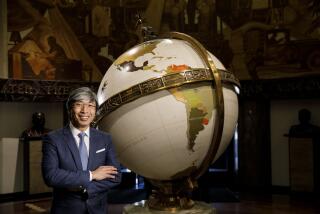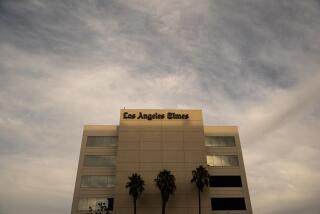McCain, Palin demand L.A. Times release Obama video
John McCain and Sarah Palin sharply criticized the Los Angeles Times on Wednesday for refusing to make public a video of a 2003 event at which Barack Obama paid tribute to a Palestinian scholar.
The Republican presidential and vice presidential nominees accused the newspaper of trying to protect their Democratic rival in the final days before Tuesday’s election.
Editors at The Times and the reporter who wrote an article in April about Obama’s connection to the Palestinian scholar, Rashid Khalidi, said they were ethically bound to abide by a promise to a confidential source not to share the video.
McCain’s spokesman had raised the issue of the video a day earlier, saying it might confirm Obama’s ties to “radicals” and show that, as a candidate for the U.S. Senate, he condoned anti-Israel rhetoric at a party for Khalidi, a friend.
The Republicans increased the pressure Wednesday, when both McCain and his running mate took up the call for The Times to release the video.
“Maybe some politicians would love to have a pet newspaper of their very own,” Palin said at a rally in Bowling Green, Ohio. “In this case, we have a newspaper willing to throw aside even the public’s right to know in order to protect a candidate that its own editorial board has endorsed. And if there’s a Pulitzer Prize category for excelling in kowtowing, then the L.A. Times, you’re winning.”
McCain said in a pair of radio interviews in Miami that he believed the video would show William Ayers, the onetime Weather Underground radical who later came to know Obama, at the same 2003 party. “Now, why that should not be made public is beyond me,” he said.
Inspired by commentators on the Internet and cable television, thousands of people e-mailed and phoned The Times to demand the release of the tape. Hundreds of others expressed support for the paper’s decision.
The controversy stems from an article by Times staff writer Peter Wallsten that the newspaper published on April 10, exploring Obama’s relationships with Palestinian Americans and Jews in Chicago. The article explained how Obama had managed to be held in high esteem by both groups. It described a party in 2003 for Khalidi, a renowned scholar on the Palestinians who in the 1970s had acted as a spokesman for Yasser Arafat’s Palestine Liberation Organization.
Some participants at the event spoke sharply against Israel. One young woman accused the Israeli government of terrorism in its treatment of the Palestinians. Obama “adopted a different tone,” according to the article, “and called for finding common ground.”
The reporter and his editors said they found it ironic to be criticized now for allegedly trying to protect Obama, noting that the story had drawn strong rebukes from Obama supporters. Commentators at two websites -- the Nation and Talking Points Memo -- charged that the newspaper had unfairly suggested that the Democrat could not have allies in both communities.
Wallsten said he had worked on and off for several weeks to gather information on Obama’s relationships in the Palestinian American community, with sources speaking only on condition of anonymity, including one who had the video.
The reporter’s editor said the paper would have preferred to be able to post the video on its website but could not get the source to agree.
“If we had not reached this agreement, we would not have had access to this tape at all. Then no one would ever have known Obama attended this event and spoke at it,” said the editor, Aaron Zitner. “We were pushing to say the most we could and to present the most we could to readers about what happened. And we did that.”
Authorities on journalism ethics generally urge news outlets to share as much original source material with their audiences as possible. Two experts said Wednesday that The Times seemed to have gained information for its readers by agreeing to keep the tape confidential, while another expert said she would have recommended the paper push hard at the time of the original reporting to allow for it to be shared with the public.
All three said that once the agreement to keep the tape confidential had been struck, the newspaper had both ethical and legal reasons for abiding by it.
“The calculus a reporter is making is: ‘What is the public good of getting the information and does it outweigh the limitations that the source wants me to put on the information?’ ” said Tom Rosenstiel, director of the Project for Excellence in Journalism. “In this case, knowing about this event and being able to describe it to readers seems like a pretty good trade-off for not being able to release the video.”
Bob Steele, a journalism values scholar at the Poynter Institute, agreed that the deal seemed sensible, though he advises reporters to avoid such agreements if possible.
“But once you make the promise to protect a source or to protect information,” Steele said, “you do not go against that promise, barring the most exceptional of cases, and this would not seem to be such a case.”
In 1991, the U.S. Supreme Court ruled that the 1st Amendment does not protect the media from breach-of-contract claims by sources with whom it makes confidentiality agreements.
Jane Kirtley, a professor of media law and ethics at the University of Minnesota, said journalists should make strong efforts to put source material in the public domain.
“In this increasingly divided, partisan world, there are fewer people, sadly, who will take the reporter’s word for it,” Kirtley said.
Times Editor Russ Stanton said the paper had no intention of breaking its promise to its source. And he rejected contentions that the newspaper had shown favoritism toward Obama.
“Any regular reader of the Los Angeles Times could tell you that we have written plenty of stories about Sen. Obama that were less than flattering,” said Stanton, who mentioned front-page stories that said the Illinois senator’s budget proposals did not add up, that described how Obama fit right in with the bare-knuckled Chicago political culture and that said fellow community organizers believed he had gotten too much credit for the work he did for the poor in Chicago.
McCain’s contention that Ayers attended the 2003 party apparently stemmed from another news article, in which the New York Sun reported on the same dinner, given for Khalidi as he was departing Chicago to take a position at Columbia University.
The Sun story describes a “commemorative book filled with testimonials” to Khalidi, including one from Ayers and his wife, Bernardine Dohrn. The story does not make clear whether the couple attended the dinner.
Democrats countered McCain’s complaints by noting that the Republican has his own ties to Khalidi. The Arizona senator once headed a nonprofit group that gave grants to an institute Khalidi headed, money that was used to conduct polling in the West Bank.
Asked to comment on McCain’s involvement with the Khalidi institute, campaign spokesman Michael Goldfarb replied, “You all can get a response as soon as you hand over the videotape.”
Rainey is a Times staff writer.
More to Read
Start your day right
Sign up for Essential California for news, features and recommendations from the L.A. Times and beyond in your inbox six days a week.
You may occasionally receive promotional content from the Los Angeles Times.







